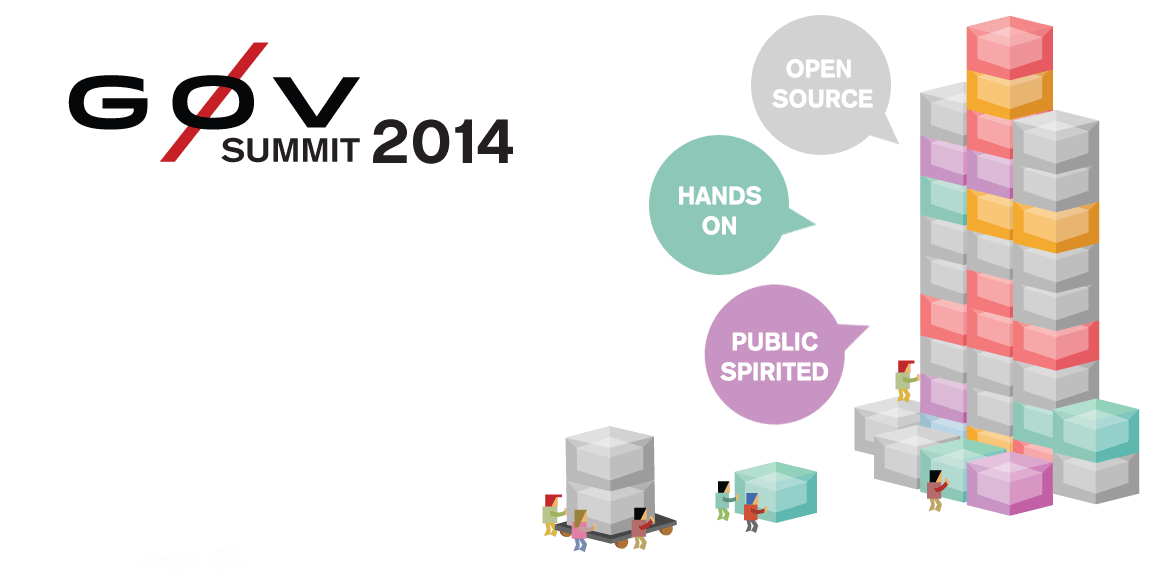
g0v Summit 2014: Taiwan and the future of democracy
I had the immense honour of being invited to participate in the g0v Summit in Taipei last year. The Summit was basically a chance for 700 people to get together and discuss the future of democracy, and hack on some projects that might help us get there faster. Here’s a video of my talk, describing some of my experiences over the past couple years and reflecting on the question: what is the government of the future? (Transcript printed below.)
It was a huge privilege to collaborate with a wide array of amazing people and organisations that I had admired from afar, like the activists from the Sunflower Movement that occupied Parliament in Taiwan; occupiers from the Umbrella Movement in Hong Kong; Clay Shirky, academic, author, and speaker; the mySociety crew, who basically invented the idea of civic tech in the UK ten years ago; respectable troublemaker David Eaves; and of course Audrey Tang and Chia-liang Kao, some of the prominent figures of the g0v community.
Of course it was a great opportunity to meet new collaborators from all over the world too, like Ciudadano Inteligente from Chile, Team Popong in Korea, Sinar in Malaysia and Open State in the Netherlands.
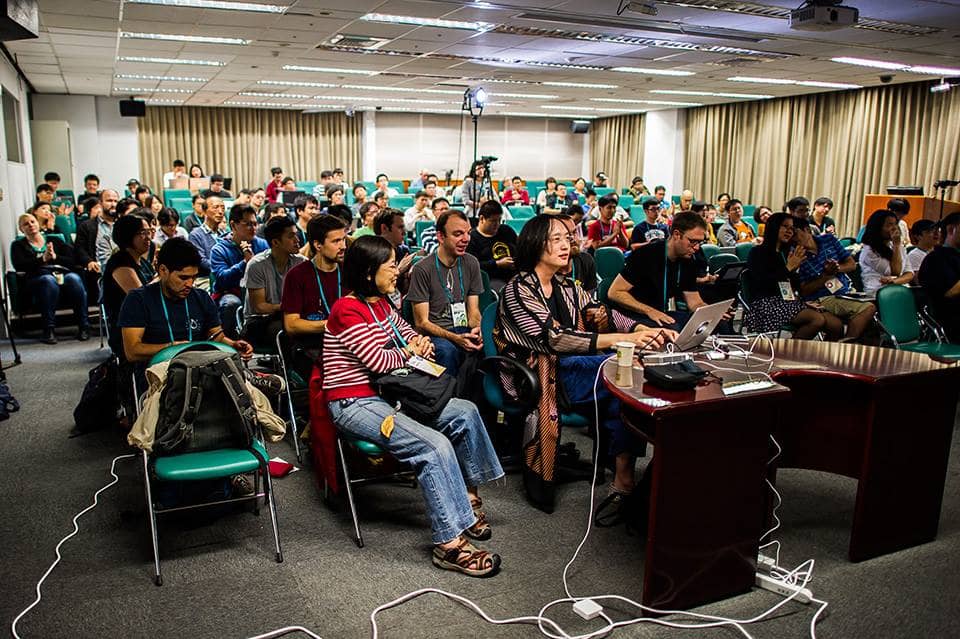
Using a combination of online technology and offline agitation, each of these projects push for greater transparency, accountability, and participation in government for regular citizens. It was delightful to see this highly distributed, autonomous network of projects all approaching this challenge with a high degree of coherence, and very little explicit coordination.
In addition to working with these great people, I also got the chance to learn a bit more about the political context in Taiwan from some of the young radicals, jaded journalists, suave diplomats and community organisers I spent time with.
It seemed like everyone I talked to mentioned the aspiration for Taiwan to become a ‘mature democracy’. However, when I asked for an example of a democratic state that was particularly worth emulating, no one had a ready answer.
As the people of Taiwan continue their struggle for a genuinely representative government independent of the Chinese mainland, and as the students of the Umbrella Movement in Hong Kong demand the right to vote for their own representatives, I can’t help but feel a sense of incompleteness in these demands. Obviously, universal suffrage would be a very good start, but it’s not enough. As I was asked to reflect on the government of the future, I can’t help but think there’s got to be more to it than voting.
Take Aotearoa New Zealand for instance: by any measure, we have a highly democratic state. We boast about our easy access to politicians, the proportional representation system that makes room for minority opinions, the relatively low corruption and high transparency throughout our institutions of government.
Despite being in a great position by global standards, the parliamentary system here is still in drastic need of an upgrade. For as long as I’ve been paying attention at least, it has proved itself incapable of responding intelligently to existential threats like climate change, or to sovereignty threats like the “free trade” agreements being negotiated in secret to promote the interests of multinational corporations, or the ongoing neoliberal assault which continues to undermine the tremendous social gains this country made in the middle of last century. In short, this ‘representative democracy’ doesn’t feel particularly representative, or particularly democratic. It feels stuck.
While it is increasingly clear that the dominant Western model of governance (i.e. some unholy collaboration between a trying-to-be-democratic state and a cabal of unaccountable transnational corporations) is incompatible with an equitable and sustainable society, I left Taiwan with a glimmer of hope that “fledgling democracies” like this one might contain the seeds of a far superior alternative.
As a foreign interloper looking at Taipei with fresh eyes, I was repeatedly struck by evidence of genuine, practical, on-the-ground democracy in the everyday operation of the city. Democracy that is, in the personal sense of the word, the non-institutional sense of the word.
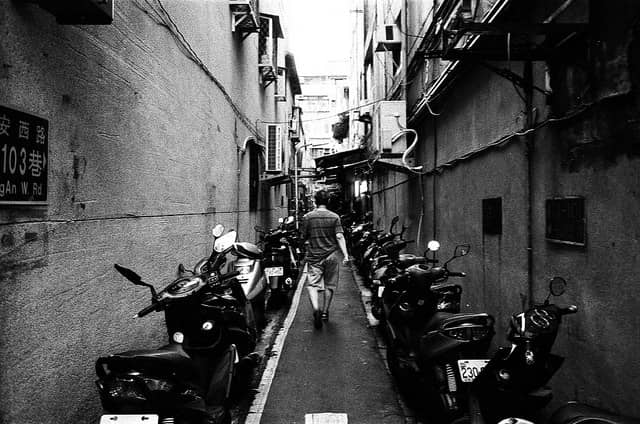
Take for example the experience of walking down a footpath, which in the space of a few dozen steps can transition from spacious walkway to scooter thoroughfare to open-air kitchen to crowded marketplace and back again. Somehow, everything works smoothly. Clearly there was no formalised permitting system to govern this diversity of uses of the common space, but for it to function as well as it does, it must be regulated by a complexity of informal agreements, negotiations and protocols — in other words: collaboration.
I wonder if the government of the future could actively foster such improvisation and spontaneity in its operations?

Or another example, the almost complete absence of litter in the streets: Taipei is far cleaner than a typical city in Aotearoa New Zealand (despite the relentless propaganda which hopes to convince the world that we are ‘clean and green’). The reason Taipei is so tidy is because people take responsibility for their own rubbish (indeed, I saw very few public bins or municipal workers cleaning up). The only place I saw litter was at the night market, i.e, where all the tourists are.
Marvelling at this tidiness, I can’t help but wonder how such a strong social consensus was established, and how it is maintained? Typically I would have assumed that developing and enforcing these kinds of guidelines that regulate individual behaviours for the good of the collective, would be considered the domain of a state legislature. But in this example, like in the footpath example, I can’t imagine formal government institutions have got much to do with it at all. It seemed to me that people just wanted to live in a tidy city, so they took their rubbish home with them.
I wonder if the government of the future could help communities identify their shared values and leave it up to them to manage how to achieve them?
These subtle threads of promise were strongly reinforced by the experience at the g0v Summit.
g0v is a profoundly inspiring organisation, a massive swarm of young people that are mostly having a good time and incidentally rewriting the political playbook for east Asia along the way. In their own words:
“g0v is a civic-tech community established in late 2012 with deep open-source roots. More than 1,000 volunteer contributors built a variety of civic-based tools at 10 major hackathons, making g0v among the largest active civic groups in Asia—not just as a community but as the very spirit of building technology and helping other communities make pragmatic changes. For more information about g0v, read the story.”
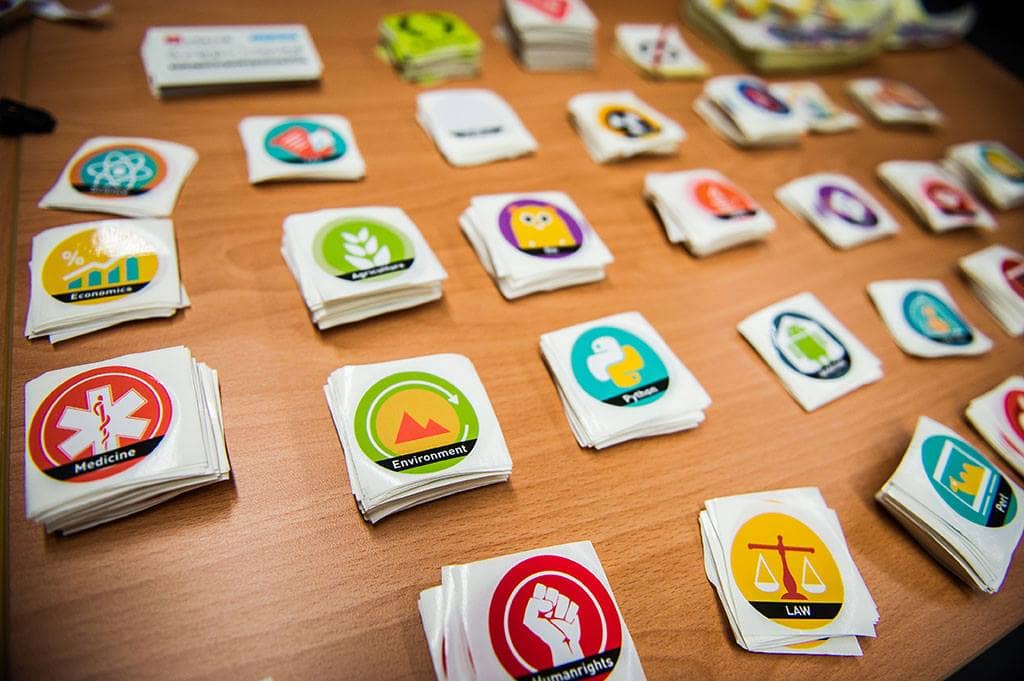
The g0v community have their own culture and methodology. Instead of leaders & followers, people identify as diggers and fillers: when you propose a new project, you’re digging a hole; when you volunteer to help, you fill the hole with your skills, work and inspiration. Perhaps this is a minor quirk, but to me at least it hints at a deep understanding of the problems with the power relationships embedded in the words ‘leader’ and ‘follower’.
I wonder if the government of the future could try digging a few exploratory holes, and see if any citizens are motivated to fill them?
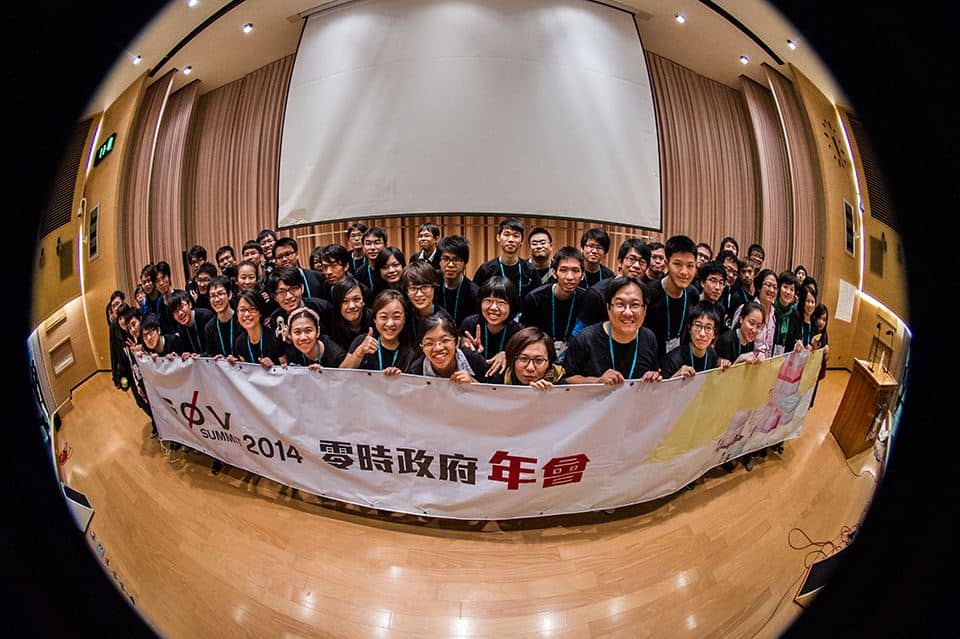
More than 100 volunteers mobilised to make the Summit happen (Audrey told me she even got to ‘delegate the delegating’). It was by far the best organised event of its kind I’ve ever been involved in, beautifully designed, exquisitely executed.
While 80% of the Summit was conducted in Chinese, I didn’t miss a word: all the main sessions were accompanied by live translations delivered by radio and webcast, and simultaneous interpreters were on hand even for the informal conversations to make sure everyone could participate.
I wonder if the government of the future could prioritise accessibility over conformity?
Overall it was a tremendously inspiring, stimulating, and warm experience. My infinite gratitude, love and respect goes to audreyt, clkao, ctblue, and the whole g0v crew. ♥
Video transcript: Open source tools for self-organising democracy {#transcript}
CL asked me to give a name to my talk, so I chose some words I’m excited about and put them together: “Open source tools for self-organising democracy”. Each of those words has a tremendous amount of meaning and feeling behind them for me.
So “open source” is a code word for “free software”. Free software is free as in it lives in the commons, it’s publically owned. People produce it together and donate it to society to use. It’s free in the sense that anyone can participate in creating it. It’s also free in the sense that it is designed to increase people’s freedoms. When we’re thinking about the future of governance and the future of democracy, those three principles are pretty exciting.
The second bit, “tools” — I’m an engineer so I get very excited about tools, the potential for technologies to shift collective behaviours. At the same time I’m a bit wary of getting too focussed on tools, this idea that if we just had the right technology then all our social and political and cultural problems would be resolved. Tools are animated by humans, they’re animated by emotion and politics and culture and empathy and love and art… the engineering solution is only one part of that circle.
The next bit: “self-organising”. All the people that I like to talk to, and the movements I’m excited about, talk about “self-organising”. I think it means that the group is organised by the people that are in it, that there’s not someone outside calling the shots. It doesn’t mean that it organises itself. There are still people that have to do the organising work. It’s important that those organisers are visible so that they can be held to account, and supported to do that work properly.
That last word “democracy”, I’ve heard it a lot over the last couple days here in Taipei. Usually when people say “democracy” they’re thinking about a system of government that operates at a state level, an institution with a very formalised process for people to interact with it. I don’t mean to offend anyone, but that kind of democracy is very boring to me. What I’m excited about is a kind of democracy that happens on a day-to-day basis, a habit instilled, a practice between me and you. The way that I relate to you, the way I listen to your experience, your opinion, and your perspective, respecting that it’s different to mine, and then look for shared agreement out of that diversity. That is the kind of democracy that I’m excited about. That’s the work I’m focussed on.
I wanted to tell a little story about what I’ve been up to for the past couple of years, the work I’ve been doing and the experiences that I’ve had, and then introduce Loomio, which is a piece of software we’ve been working on, then talk about Podemos, which are a group that have been using Loomio extensively – I think there are some lessons that we could apply here in Taiwan.
Then I’d like to draw some parallels between all the different social movements: I come from the Occupy movement, prior to that was the M15 Indignados movement, the Arab Spring, the Sunflower Movement, Occupy Central in Hong Kong… there’s this ongoing wave of social movements. I think they’ve got some parallels between them so I’d like to draw some of that out.
So a little story about me. In 2008 I graduated with my engineering degree. As you might recall, 2008 was a very bad time to try to find a job. I found myself in this position where I’d done all the right things, I’d gone to university, tried hard, got good grades, then I graduated and there was no job for me. As a result I had to spend some time figuring out what I would do with myself as I’m unemployed.
I spent some of that time looking at what’s going on in the world. The more informed I became, the more depressed I became. Looking around the world and seeing so many massive complex challenges facing us, whether that’s catastrophic climate change, or ecosystem collapse, or our perverted system of government, or growing inequality between rich and poor – all these issues that are so complex and so far beyond the scope of what I could possibly do anything about – the consequence of learning about those things was that I depressed, disengaged, cynical. I was one of those “apathetic young people” that you read about in the newspaper.
Then in 2011, the Occupy movement took off in Wall Street. I saw some images coming through my Facebook of this interesting new kind of movement that I’d never seen before. So when the movement touched down in Wellington, New Zealand where I’m from, I knew that I had to go down at least just see what was happening there. I had no intention of participating, but I was curious to have a look.
Almost as soon as I entered into the Civic Square, where the Occupy camp was established in Wellington, my life completely changed. My perception of myself and my role in the world completely changed. My perception of others and the role that they have to play, what a group of citizens is capable of.
I put it exclusively down to the methodology, the practice of direct democracy that we were playing with in Occupy. We had a shared understanding that there are these massive global challenges. Then we’d sit in a circle and hear from everyone, one by one, “What do you think we should do about it?”
The process of participating, where everyone was expected to contribute, and could expect to be heard – that’s an experience that most people don’t get. The first time I had it, I was addicted and I wanted more, and to share it with more people.
While that Occupy experience was incredibly liberating, inspiring and exciting, it was also at times crushingly depressing, when you find yourself in meetings for 6 hours and discover that people don’t actually understand each other very well. So there are conflicts, and we’re all amateurs that don’t know what we’re doing, we’re making it up as we go along… you get these pointless debates that go forever. Over the space of weeks and then months, our camp, like so many other Occupy camps around the world, disintegrated into this really unpleasant place. It started as this utopia, and wound up as this zombie apocalypse.
So me and a few other people from the Wellington camp, along with other people around the world, were having this conversation about how could we learn from this amazing and inspiring methodology, this practice of direct democracy, while bypassing some of the major pitfalls. The obvious answer was to use technology, to replace the General Assembly where people have to sit together in the same place at the same time, and move that into an online space where people can participate on their own terms, when they have time, on the issues they care about.
So we got together and started this project called Loomio. The word “Loomio” comes from the idea of a “loom”, a weaving tool, the idea being that we weave everyone’s different perspectives together into something stronger than any individual thread.
Loomio is a very basic, minimal piece of technology. It’s an online discussion forum. You have a group of people that talk about a topic. Anyone in the group can put forward a proposal saying, “I think we should do this ____,” or, “do you agree with this idea?”
That’s all it does, there’s no more to it than that, and I don’t want to over emphasise how amazing this technology is: it’s just a discussion, with a decision on the side. But it allows people to organise themselves democratically. So anyone can participate, and anyone can show that initiative and say “I think we should do this,” and then develop a shared understanding and be empowered to act.
As soon as we had the most basic prototype running, we started bringing people on to the software. We learned from their real experiences of how they’re using it to decide what should be the next thing that we build. Like, what’s the most annoying part of the software that we should fix tomorrow?
We were quite surprised, coming from this activist background, we were surprised at just how many different kinds of groups that came to us and said, “we need this tool! We need to make decisions together online – there has to be a better way than all these horrible meetings!”
In the last two and a half years, we’ve been completely swamped with demand from extremely diverse groups from all over the world. Whether that’s the City Council in Wellington that were trying to evict us from their lawn when we were occupying, now they’re using Loomio to work with citizens to develop policy; or it’s a company with offices around the world that want to collaborate with each other across different time zones; and of course many different social movements and political parties.
So we have this mass of different kinds of people. One of the central themes from very early on was our community saying, “We need you to translate this into as many languages as possible.” These new pro-democracy movements are happening all over the world so we need to ensure we can deliver this technology into people’s hands in their own languages. I think today we’re at 30 languages, when I was first putting this talk together it was 27; it’s increasing very rapidly because we have a massive community of volunteers.
Every time there’s a new social movement, like last year there was student movement in Hungary, then the next day Loomio is available in Hungarian, then we saw this happening with the Sunflower Movement, that turned up and then suddenly Loomio is translated into Chinese.
I wanted to talk briefly about one of the groups that are using Loomio. So the history of these social movements – it’s hard to say exactly when it started, but about the same time as the Arab Spring was taking off, there was the M15 Indignados movement in Spain. So “indignados” as in “indignant, angry, upset.” Because they were so successful, that was the precursor to the Occupy movement, as people in New York saw the way they were organising themselves and occupying public spaces and said “this is really effective, we’re going to import it into the English-speaking world and call it ‘Occupy’.” Subsequently of course Occupy spread to thousands of cities and continues to morph; now we’re seeing it in Hong Kong. It keeps adapting and changing its context, hopefully learning as it travels.
One of the outcomes of the Indignados movement is this new political party in Spain, called Podemos, which means “we can”. Just that movement from “indignant” to “we can” is very instructive. It starts with being indignant, it’s an important place to start. I’m indignant! I’m angry with the status quo! So first I met with other people that share my anger and grief, and in expressing it together discovered that there are many people in my society that are angry and indignant too. Then once we have that sense of collective identity, then we can move on to constructive action, “we can.”
Podemos are organising in Circles. They have geographic Circles, all over Spain there are thousands of groups operating both online and offline, they have local assemblies where they meet together, and they have an online component where they’re using Loomio and a lot of other tools to facilitate policy development and strategy and so on for their party. In addition to the geographic Circles, there are thematic Circles, things like economics, or transport, or the food system.
They’ve only been around for nine months, and they’ve started more than 1,000 Loomio groups in that time, all of them started independently. There’s not someone that’s coordinating people and telling them “you start one for this area, and you start one over there,” it’s self-organising: people are coming out and doing it themselves.
The reason I’m excited about it and talking about it now, is that this party that’s nine months old – this week there was an opinion poll that put them as the number one most popular party in Spain. That’s a massive shift in power in a country that has had very stale and very corrupt politics with very anti-social policies for a very long time. Suddenly we’re seeing a shift in the balance of power away from the formal institutions to the grassroots. I want us to look at them closely and learn how they’re doing it.
I wanted to draw some parallels between the different social movements, and about this idea of “power”. One definition of power is “the ability to act,” a kind of freedom of movement. In my story, where I started out depressed and disengaged, I didn’t have any power. At least I wasn’t aware that I had any power, I wasn’t exercising it. Then I had my first interaction with this methodology, this participatory way of working, I became empowered. I discovered that I had the ability to act, that I could move and have an influence on the people around me.
Beyond that there’s the next level of power which is collective power, where you get a group of people that harness their freedom of movement together, and point it in a coherent direction. When you look at the world and you see who is powerful, it’s the groups of people that are the most coordinated. Think about who are the most coordinated groups of people? Armies, states, corporations, religions; these sorts of institutions that are very effective at shaping the world in the image they’d like it to be. They all use the same methodology, a hierarchical structure where there’s someone at the top, usually a man, who’s telling everyone else what they should do. There’s a very rigid structure for how information and control gets passed around.
As we look to new social movements and the future of democracy, I think we need to be wary of that methodology, that we don’t adopt it, because I think whoever adopts that methodology winds up looking the same. You turn into one of these institutions that is more interested in preserving itself, rather than achieving some positive impact on the world.
We need to be coordinated and organised if we’re going to achieve anything, but I think we need to organise in a new way. That’s the part of the problem that Loomio is focussed on at the small scale: our largest effective groups are that the scale of 5-600 people. Beyond that there is obviously a much larger scale, thousands, millions, hundreds of millions. There are other tools around looking at that problem.
One I’m particularly excited about at the moment is called DemocracyOS which is for large-scale citizen deliberation. They take government policies, translate them into plain language, then host a deliberation about how the citizens feel about this policy. There’s many more tools besides, and together we’re trying to collaborate and figure out which part of the problem we each are trying to solve, and how can we help each other along the way.
I wanted to look at this concept of government, given that we’re at the g0v Summit. Personally I started from the position of being quite anti-government, I was outside with my fist up, that’s my native place to live. In the last couple of years that I’ve been doing this work, and meeting with different kinds of people, I’ve realised that there are a lot of people in government that have very good intentions, they have the same motivations as me. One lesson for me was to learn that I have allies in all sorts of places. We can identify who has shared aims, look for the shared understanding, like a little island of agreement that we can stand on together, and then expand.
There’s an idea of government as mass collaboration. In addition to being an engineer, I’m also a musician. The most sublime euphoric experience I can imagine as a musician, is when we have a group of musicians together, improvising, collaborating, each of us expressing ourselves with full autonomy, with no-one directing us or telling us who’s turn it is to take a solo, and yet we’re still creating something that’s a collective whole, a beauty that is far bigger than any of the individual parts. I like to think about that experience and imagine how we could make government behave that way. How can we have a government that is simultaneously collaborative, and really creates space for people to express themselves in their full autonomy and still create some collective motion and shared goals.
“What is government for?” might be a question to start with.
I don’t want to be critical, but I have a little bit of discomfort with this whole notion, when we’re trying to talk about the future of government and the future of democracy. I have a discomfort with this context we’re in now, where there’s one person on the stage and a room full of people that are listening. The architecture of this room suggests that what I have to say is more important than what you have to say, and your job is just to listen. I don’t think the future of democracy looks like this room. While it might be interesting to hear one person tell a story about their past experiences, that’s not the future of democracy.
The future of democracy is up to each and every individual in this room, and what you’re going to do when you leave and return to your community, what kind of change that you want to make. That for me is the future of government. That’s the future of democracy.
Got something to add? Join the discussion on Loomio.
